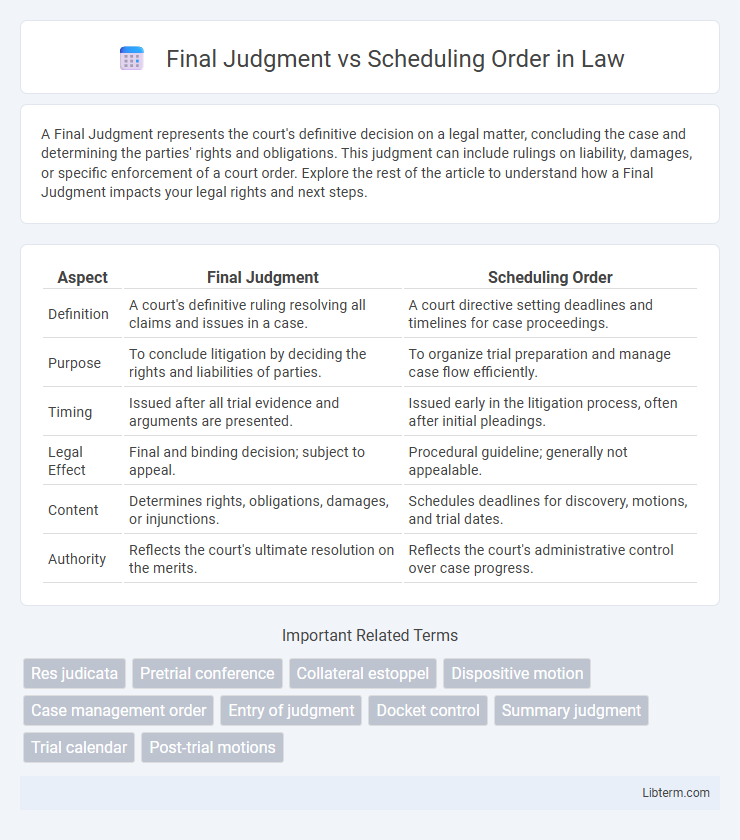A Final Judgment represents the court's definitive decision on a legal matter, concluding the case and determining the parties' rights and obligations. This judgment can include rulings on liability, damages, or specific enforcement of a court order. Explore the rest of the article to understand how a Final Judgment impacts your legal rights and next steps.
Table of Comparison
| Aspect | Final Judgment | Scheduling Order |
|---|---|---|
| Definition | A court's definitive ruling resolving all claims and issues in a case. | A court directive setting deadlines and timelines for case proceedings. |
| Purpose | To conclude litigation by deciding the rights and liabilities of parties. | To organize trial preparation and manage case flow efficiently. |
| Timing | Issued after all trial evidence and arguments are presented. | Issued early in the litigation process, often after initial pleadings. |
| Legal Effect | Final and binding decision; subject to appeal. | Procedural guideline; generally not appealable. |
| Content | Determines rights, obligations, damages, or injunctions. | Schedules deadlines for discovery, motions, and trial dates. |
| Authority | Reflects the court's ultimate resolution on the merits. | Reflects the court's administrative control over case progress. |
Understanding Final Judgment in Legal Proceedings
Final judgment in legal proceedings signifies the court's definitive decision resolving all claims and issues, providing closure to the case. It determines the rights and obligations of the parties and is typically appealable, unlike a scheduling order, which only establishes the timeline for case management. Understanding final judgment is crucial because it marks the end of litigation and triggers enforcement or appellate procedures.
Defining Scheduling Order: Structure and Purpose
A scheduling order is a court-issued directive that outlines the timeline and procedural framework for a lawsuit, including deadlines for discovery, motions, and trial dates. It serves to organize the litigation process, ensuring parties adhere to a structured timetable and preventing delays. Unlike a final judgment, which resolves the case on its merits, the scheduling order strictly manages case progression and procedural efficiency.
Key Differences Between Final Judgment and Scheduling Order
Final Judgment legally concludes a case by resolving all claims and issues, enabling appeals and enforcement, whereas a Scheduling Order sets deadlines and manages case progress without deciding the merits. Final Judgment embodies a court's definitive ruling on the entire action, while a Scheduling Order structures pre-trial procedures such as discovery timelines and motion deadlines. The Final Judgment carries binding legal effect, while the Scheduling Order facilitates case management and procedural efficiency.
Legal Significance of Final Judgment
Final judgment signifies the court's definitive decision resolving all claims and issues in a case, establishing the parties' rights and obligations and enabling the entry of a binding and enforceable order. Unlike a scheduling order, which merely manages case timelines and procedural steps, a final judgment concludes litigation and is appealable. The legal significance of a final judgment lies in its authority to terminate the lawsuit and provide the basis for enforcement or further appellate review.
Importance of Scheduling Orders in Case Management
Scheduling orders are crucial in case management as they establish clear timelines for pleadings, discovery, and pretrial motions, ensuring efficient court proceedings. They facilitate organized case progression by setting deadlines that prevent delays and encourage timely resolution of issues. Unlike a final judgment, which concludes litigation by resolving the merits, scheduling orders maintain procedural discipline throughout the case lifecycle.
Impact of Final Judgment on Parties Involved
Final Judgment conclusively resolves the rights and liabilities of the parties, creating a binding decision that can be appealed or enforced immediately. It significantly impacts parties by terminating the litigation on the merits, dictating the final outcome of the dispute, and often resulting in enforcement actions or remedies. Unlike a Scheduling Order, which merely manages pretrial proceedings, a Final Judgment imposes legal obligations and provides closure to the parties involved.
The Role of Scheduling Orders in the Litigation Process
Scheduling orders play a crucial role in managing the timeline and procedural steps of litigation by setting deadlines for motions, discovery, and trial dates, ensuring efficient case progression. Unlike final judgments that resolve the substantive rights and liabilities of parties, scheduling orders primarily govern the procedural framework and prevent unnecessary delays. Courts rely on scheduling orders to maintain control over the litigation process and facilitate timely resolution.
Procedural Implications: Final Judgment vs Scheduling Order
A Final Judgment conclusively resolves all claims and issues in a case, creating binding legal effects and enabling immediate appeal, whereas a Scheduling Order primarily manages case timelines without deciding substantive rights. Scheduling Orders establish deadlines for motions, discovery, and trial, ensuring procedural efficiency but remain non-appealable and modifiable by the court. Understanding these procedural implications aids in strategizing litigation management and appellate options.
Enforceability: Comparing Final Judgment and Scheduling Order
Final judgment carries immediate enforceability as it represents the court's definitive determination of the parties' rights, allowing for execution or appeal without delay. Scheduling orders lack inherent enforceability since they primarily set procedural timelines and deadlines, requiring court intervention to address violations or enforce compliance. Courts treat final judgments as binding resolutions, whereas scheduling orders function as management tools for case progression rather than substantive rulings.
Practical Considerations for Lawyers and Litigants
Final judgment marks the conclusiveness of a case and triggers the timeline for appeals, demanding precise analysis by lawyers to ensure all issues are resolved before entry. Scheduling orders dictate procedural timelines, helping litigants manage discovery, motions, and trial preparations efficiently to avoid delays or sanctions. Effective navigation of both instruments is critical for strategic planning and safeguarding clients' procedural rights throughout litigation.
Final Judgment Infographic

 libterm.com
libterm.com